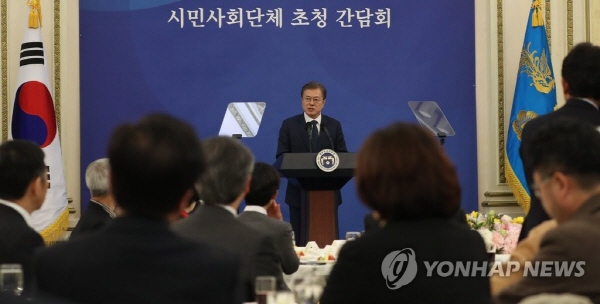President Moon Jae-in reaffirmed his support for civic activist groups Monday, calling them "important partners" in efforts to reform the nation.
"Making laws, regulations and distributing national resources is up to the government and the political sector, but the civil society demands, spearheads and creates the power to improve laws, regulations and ensure proper distribution of national resources," the president said in a meeting with some 80 officials and representatives from various civic organizations.

The meeting at the presidential office Cheong Wa Dae in Seoul marked the first of its kind since Moon took office in May 2017.
"Our civil society has better served the important role of checking and criticizing the government and providing alternate solutions than anyone else and has led the development of our society," the president told the meeting.
Moon noted his administration may owe civic organizations for its very existence, saying his government was built on the wishes of civic groups that staged candlelight vigils that led to the ouster of his conservative predecessor Park Geun-hye in early 2017.
"The civil society that played a leading role in the candlelight revolution is a partner and participating member in managing state affairs," he said.
The president asked civic organizations to continue to help change the nation, especially in areas where government efforts may fall short.
Such areas may include efforts to rid North Korea of its nuclear weapons, he said.
"The government is doing its utmost, but the civil society's role is also important in areas that are out of the government's reach. A large part of establishing peace on the Korean Peninsula must be done politically and diplomatically, but because hostility and confrontation have continued for a long period of time, it is also very important to have the people recognize peace as the most important value and realize peace in their everyday lives," the president added.
He also highlighted the need to resolve differences through dialogue.
"What is especially important is that we try and reach social consensus on important issues that are likely to create conflicts," the president said.
Moon currently faces criticism from workers over the latest government attempt to somewhat ease restrictions under the new 52-hour work week system, while he appears to have lost many votes from local businesses and entrepreneurs for steep minimum wage hikes over the past two years that many claim have made it nearly impossible to do any business here.
The president acknowledged some shortfalls in his trademark income-led growth strategy.
"It appears the general increase in the income of hired workers is a clear success. But on the other hand, the criticism that we have rather failed to narrow the income gap does have a point because it is true that the increase in the number of jobs has slowed and the income of households outside of employment has been reduced," Moon said in his closing remarks, according to Cheong Wa Dae vice spokesman Han Jung-woo.
"That is why I say the government will step up its efforts to properly establish a social safety net by reducing income gaps by boosting the income of such workers while making sure no one is forced out of the job market and also guaranteeing the income of such persons," the president added. (Yonhap)

